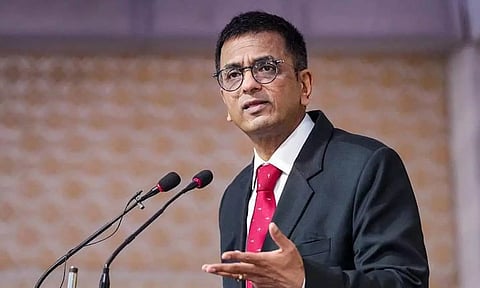

NEW DELHI: Chief Justice of India (CJI) D Y Chandrachud on Thursday said the Supreme Court is setting up its own cloud software for video conferencing to enable virtual hearings in all lower courts across the country.
During the Constitution Bench hearing on Article 370, senior advocate Dushyant Dave suggested if the technology-driven hybrid hearings could also be extended to the district judiciary.
“If you could carry this (virtual hearing) to the lowest of the courts, including mofussil courts. It would be the greatest contribution,” he said.
At this, CJI Chandrachud said: “In Phase-III of eCourts (Project), we have a huge budget, so we are in process of setting up our own cloud software for video conferencing.”
In a short exchange, he recollected as to how state governments play a vital role in providing funds for judicial infrastructure in courts.
“Some state governments are very supportive, others you know are… I remember at the time of pandemic, I won’t name the High Court. They did not have the money to pay for licenses of these video (conferencing) platforms,” CJI Chandrachud said.
“They (that HC) were absolutely in a dire state. There was a lockdown and it was impossible to run the court without video conferencing,” he said, adding that the Supreme Court transferred its video conferencing license to them.
In his recent address to the convocation ceremony of the Indian Institute of Technology (IIT) Madras, the CJI had said that during the pandemic, courts across India held as many as 43 million hearings through virtual mode.
He said that these virtual hearings helped female lawyers in particular, as they otherwise face difficulties appearing physically in court due to the gender demands of domestic work and caregiving.
At an earlier occasion, CJI Chandrachud had pointed out that between March 23, 2020 and October 31, 2022, the Supreme Court alone heard 3.37 lakh cases through video conferencing.
While hearing a plea for declaring virtual hearing as a part of fundamental rights, a CJI-led bench had stressed that technology is not just for the pandemic and High Courts should not insist on physical presence of lawyers.
It had also asked the Chairman of Bar Council of India to call a report from Bar Councils of various states on steps to be taken to improve the use of technology for the lawyers.
In its e-initiative measures, the Supreme Court began live streaming proceedings of the Constitution Bench on YouTube and used artificial intelligence and natural language processing technology for live transcription of such hearings of national importance.
Notably, the Union government in its budget has announced that Rs 7,000 crore would be made available for eCourts Project, which will be used for infrastructure improvement in all the district courts also.